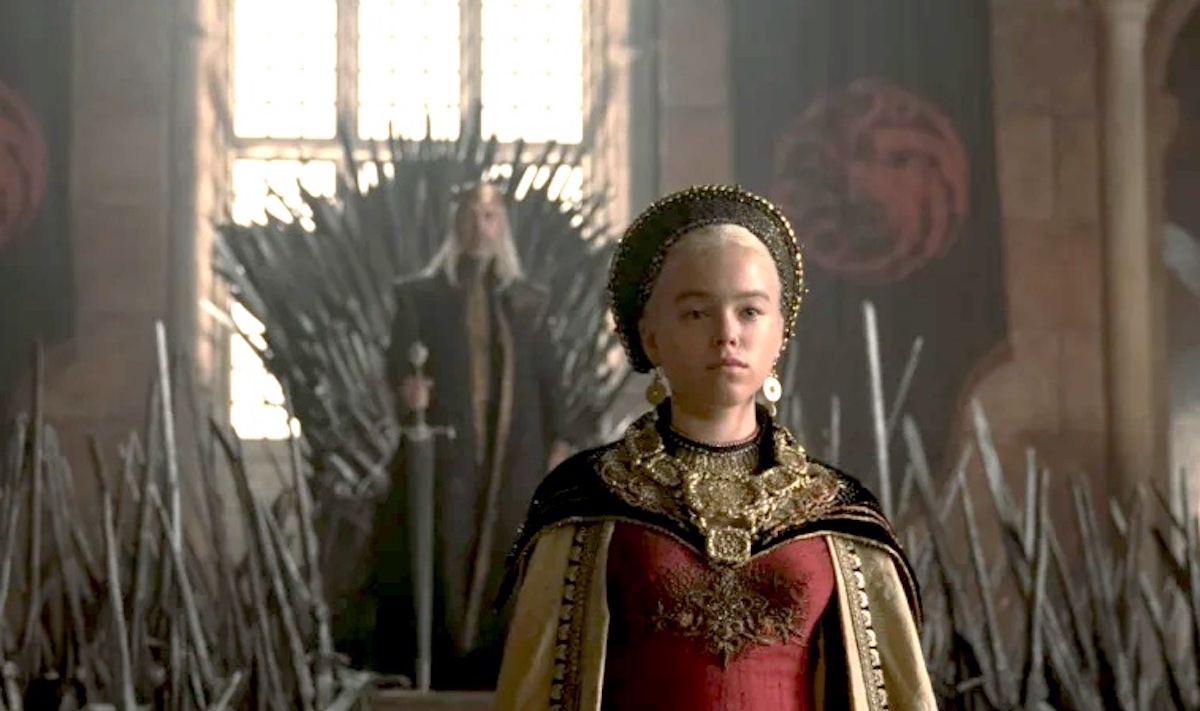If there’s one thing that “The Burning Mill” confirmed once more is that the one true god of Westeros is the patriarchy followed closely by its emanation, feudal monarchy. I don’t think anyone can argue the world of ASOIAF isn’t violently patriarchal, no matter where in the Seven Kingdoms or Essos you land.
And that’s what makes watching female characters try to navigate a society that is so stacked up against them so compelling, especially when those female characters are well-written and well-understood—something that House of the Dragon seems to be doing very well. Every single woman on screen has to deal with the patriarchy, and it influences not just her own actions but also her relationships with the other women around her.

This episode gave us some marvelous examples of it—particularly when it comes to power and motherhood.
Spoilers ahead for season 2, episode 3 of House of the Dragon, “The Burning Mill”
Rhaenyra, Rhaena, and motherhood
I think we can all agree that Rhaena and Baela, the twin daughters of Prince Daemon and his first wife Lady Laena Velaryon, are criminally underutilized in the show—but then again, the scene that Rhaena shares with Rhaenyra in “The Burning Mill” is one of the most poignant of the entire series.
Rhaena is entrusted by Rhaenyra to accompany the youngest of her sons—Princes Joffrey, Aegon, and Viserys—to the Eyrie, where they will be kept safe, and from there to the Free City of Pentos when they manage to find passage. While Rhaenyra tries to spin this as an honorable task, Rhaena is not fooled—she’s being diminished to the role of nursemaid when her whole family is going to war.
That’s because unlike her twin Baela, who patrols the skies with her dragon Moondancer, Rhaena is not a dragonrider. The absence of a dragon makes it impossible for her to step out even a little from the traditional role women are supposed to hold in Westeros as the closest members of her family do. No matter how one looks at it, Rhaena realizes—and is rightfully angry about it—that she’s simply being shoved into the cage that all Westerosi women find themselves in sooner or later and being told to like it, even if her journey’s final destination is the same place where her mother died.
And it’s so interesting that it’s Rhaenyra who is forcing this task on her, essentially outsourcing motherhood to Rhaena—and I’m not saying she does this happily or maliciously, of course, we can clearly see that she’s upset at having to send her children away without knowing when she will see them again. But Rhaenyra has always danced on the border of gender norms because while she herself has a bigger chance to break somewhat free of them than any other woman in the realm she’s constantly forced to navigate them when it comes to other women.

It’s a conflict that began way back in season one, in the different way Rhaenyra and Alicent were put in front of the prospect of marriage and motherhood—one with a modicum of choice, the other with no choice at all. And in this episode, those same two characters explore another version of the same issue—being a woman in the Seven Kingdoms.
Alicent, Rhaenyra, and political power
Throughout the episode leading up to their reunion in the sept, we are shown how both Alicent and Rhaenyra are kept on the margins of political power. We are more used to seeing it with Alicent—let’s not forget how she was not included in the usurpation plan, which ultimately makes her misunderstanding Viserys absolutely irrelevant because Otto would have gone ahead with his plot no matter what—even though it’s definitely gotten more virulent now that she has moved from the position of Queen Consort to that of Queen Mother and also now that her father has been ousted as Hand of the King.
But even Rhaenyra, who is Queen in her own right and should be the one dictating her side’s policies, is constantly spoken over by the lords in her council. The only people who are actually listening to her and her reasons are Rhaenys and Mysaria, while all the men around her—Daemon included, it has to be said—either try to persuade her to act like they want her to or simply dismiss her alright. Not even the most powerful woman in the realm can be completely free from the misogynistic society in which she lives. We hate to see it but also we love to explore it.









Published: Jul 5, 2024 12:26 pm